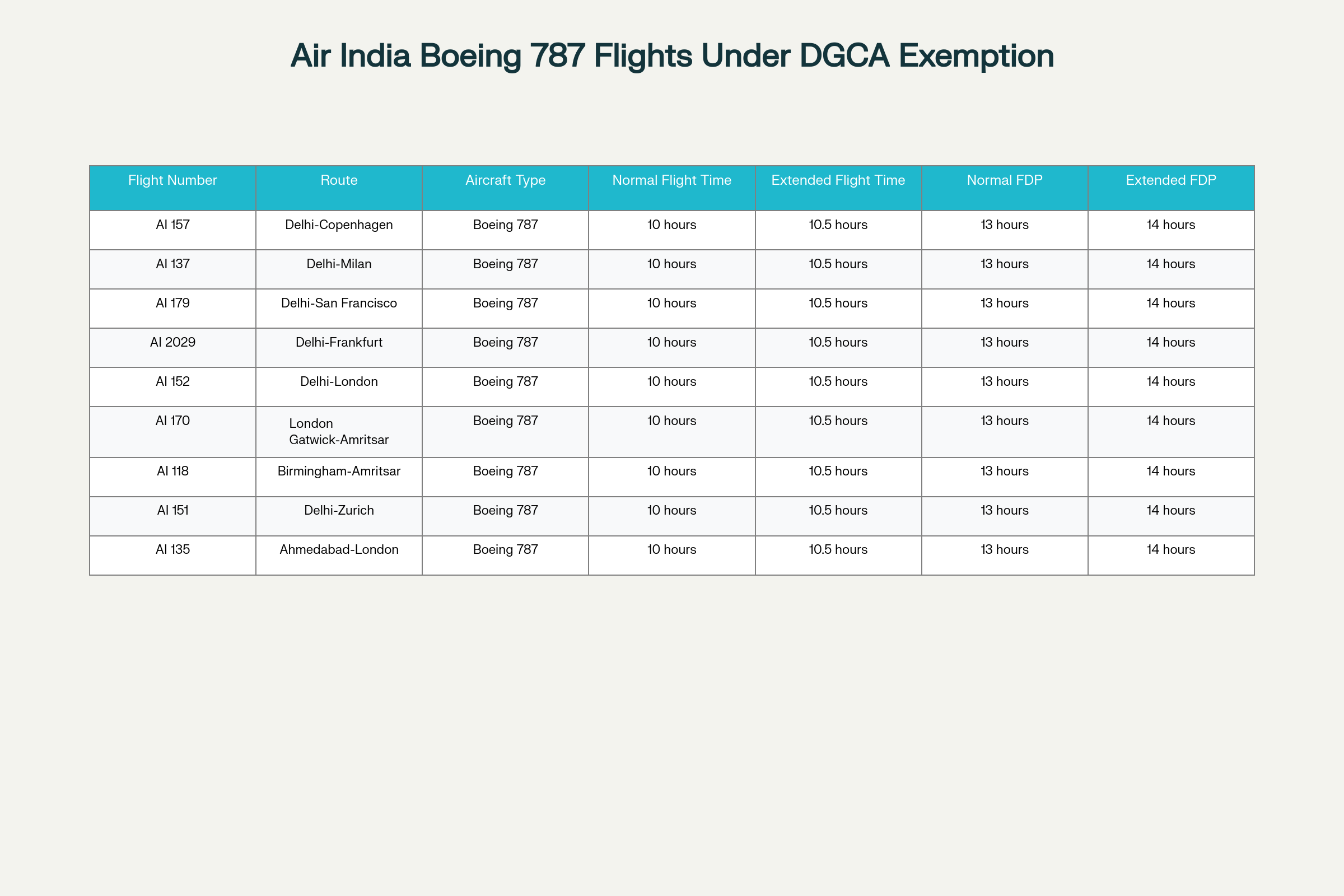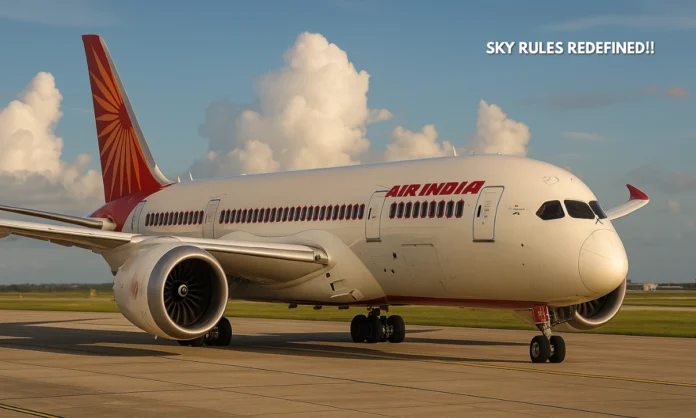Key Highlights
- The Directorate General of Civil Aviation has approved a temporary exemption allowing Air India’s Boeing 787 crews to exceed standard duty limits by 30 minutes flight time and one hour flight duty period under specific operational conditions
- The exemption applies to nine specific long-haul European routes operated by two-pilot Boeing 787 crews from October 26, 2025, through March 31, 2026, covering the airline’s winter schedule
- Air India faces an estimated Rs 4,000 crore annual loss due to Pakistan airspace closure, forcing longer routing and increased operational costs that necessitated this regulatory relief
DGCA Exemption for Air India Boeing 787 Flights: Initial Context and Regulatory Framework
The aviation industry in India received significant attention on November 1, 2025, when the Directorate General of Civil Aviation granted Air India a carefully structured exemption for its Boeing 787 long-haul operations. The DGCA exemption for Air India Boeing 787 flights represents a strategic response to unprecedented operational challenges facing the national carrier during its winter schedule period. This regulatory decision allows select Boeing 787 two-pilot crews to operate up to 10 hours and 30 minutes of flight time, extending the previous 10-hour limit, while also permitting Flight Duty Periods to reach 14 hours instead of the standard 13-hour maximum.
The timing of this DGCA exemption for Air India Boeing 787 flights coincides with the implementation of India’s Winter Schedule 2025, which became effective on October 26, 2025, and will continue through March 28, 2026. According to official Ministry of Civil Aviation data, the winter schedule encompasses 26,495 weekly departures connecting 126 airports, representing a 5.95 percent increase compared to the previous winter schedule. Air India accounts for 4,277 weekly departures in this schedule, making it the second-largest operator after IndiGo’s 15,014 weekly flights. The DGCA exemption for Air India Boeing 787 flights specifically targets nine European routes that have been significantly impacted by geopolitical developments and operational constraints beyond the airline’s control.
Aviation regulator extends duty hours for #Boeing787 pilots on 8 specific flights from Sunday. @airindia group is the only one presently which has these planes. Pilot body @AlpaIndia demands its withdrawal @NewIndianXpress @DGCAIndia pic.twitter.com/sptKYLlJnT
— S. Lalitha (@Lolita_TNIE) October 27, 2025
Operational Challenges Driving the Exemption
Pakistan’s airspace closure has created substantial operational difficulties for Indian carriers, particularly affecting Air India’s European and North American routes. The DGCA exemption for Air India Boeing 787 flights directly addresses these challenges by providing regulatory flexibility for routes that have experienced increased flight times due to mandatory detours around Pakistani airspace. Industry estimates suggest that Pakistan’s airspace closure has caused Indian airlines to face nearly Rs 7,000 crore in additional annual costs, with Air India bearing the largest impact at approximately Rs 4,000 to Rs 5,000 crore due to its extensive international operations.
The airline generates nearly 60 percent of its revenue from international operations and operates 70 weekly flights to seven North American destinations, with 58 originating from Delhi. Currently, Air India manages its North American flights through technical stopovers in Vienna and Copenhagen, adding significant operational complexity and crew duty time considerations. The DGCA exemption for Air India Boeing 787 flights acknowledges these constraints while maintaining strict safety oversight through specific conditions and limitations. Weather pattern changes during winter months further compound these challenges, as anticipated wind variations can marginally increase flight times on certain European sectors, making the exemption essential for operational continuity.
Specific Routes and Aircraft Coverage
The DGCA exemption for Air India Boeing 787 flights covers nine strategically important European routes that form the backbone of the airline’s long-haul network during the winter schedule. These routes include Delhi-Copenhagen (AI 157), Delhi-Milan (AI 137), Delhi-San Francisco (AI 179), Delhi-Frankfurt (AI 2029), Delhi-London (AI 152), London Gatwick-Amritsar (AI 170), Birmingham-Amritsar (AI 118), Delhi-Zurich (AI 151), and Ahmedabad-London (AI 135). The exemption specifically applies to Boeing 787 aircraft operating with two-pilot crews, recognizing the unique operational characteristics and capabilities of this modern wide-body aircraft type.
Air India operates a total of 33 Boeing 787 Dreamliners, including 26 Boeing 787-8 variants with an average age of 10.9 years and seven Boeing 787-9 aircraft acquired from its merger with Vistara. The DGCA exemption for Air India Boeing 787 flights represents approximately 27 percent of the airline’s Dreamliner fleet operations, highlighting the significance of these routes to the carrier’s international network. The airline has been operating Dreamliners for over 12 years since inducting its first aircraft in September 2012, making it the first Indian operator of this aircraft type and the fifth airline globally to operate the Dreamliner. This operational experience provided crucial background for the DGCA’s decision to grant the exemption while maintaining stringent safety requirements.

Safety Measures and Industry Response
The DGCA exemption for Air India Boeing 787 flights includes comprehensive safety measures designed to mitigate fatigue risks and maintain operational safety standards. Crews operating under this exemption must receive an additional one hour of rest beyond the minimum required at layover stations for long-range operations. The exemption specifically prohibits its use for advance flight planning where flight times are expected to exceed 10 hours 30 minutes or Flight Duty Periods are expected to exceed 13 hours, limiting application to post-departure situations caused by weather diversions, congestion, or unforeseen air traffic delays.
The Airline Pilots’ Association of India has expressed concerns about the DGCA exemption for Air India Boeing 787 flights, arguing that extended duty hours could increase the risk of fatigue-induced errors. The association urged the DGCA to withdraw the relaxation, stating that it gives the impression of prioritizing operator convenience over flight safety. However, the DGCA defended its decision by emphasizing that the exemption represents a one-time approval for specific operational circumstances, with mandatory monthly fatigue reporting and prohibition of training flights under the relaxed conditions. The Federation of Indian Pilots has also questioned the regulatory approach, particularly regarding compliance with Delhi High Court orders on pilot duty limitations.
Closing Assessment
The DGCA exemption for Air India Boeing 787 flights represents a carefully calibrated regulatory response to extraordinary operational challenges facing India’s national carrier during the 2025-26 winter schedule. While pilot associations have raised legitimate safety concerns, the exemption’s restrictive conditions and specific applicability to post-departure situations demonstrate the regulator’s commitment to maintaining safety while providing necessary operational flexibility. The Rs 4,000 crore annual impact from Pakistan airspace closure underscores the economic pressures that necessitated this regulatory intervention, particularly for an airline undergoing comprehensive fleet modernization and route expansion.
The six-month validity period of the DGCA exemption for Air India Boeing 787 flights, running through March 31, 2026, allows for careful monitoring of safety outcomes while providing operational stability during the challenging winter period. As Air India continues its transformation under Tata Group ownership, with outstanding orders for 529 new aircraft including additional Boeing 787-9 variants, this exemption serves as a bridge measure to maintain service reliability while longer-term solutions to airspace restrictions are developed. The aviation industry will closely observe the implementation of this exemption, as it may establish precedents for future regulatory approaches to geopolitical disruptions affecting airline operations.


